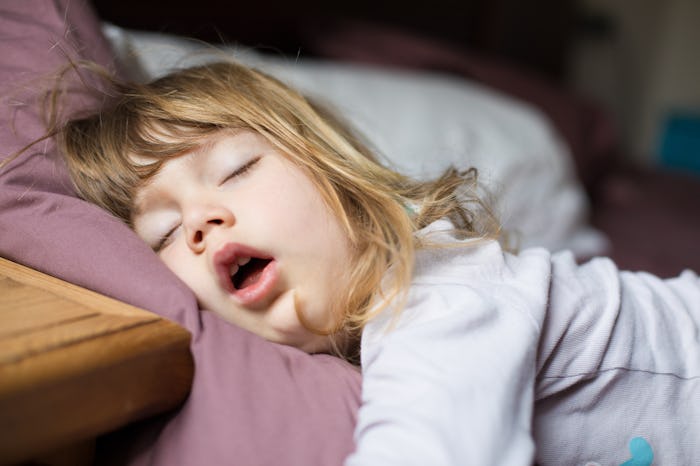Snooze On

Will White Noise Machines Affect Toddler Speech? Experts Weigh In
Just don’t crank it all the way up.
Your barking dogs, the neighbor’s loud music, and just normal sounds of daily life — it all feels like blaring noise when your baby or toddler is finally, blissfully asleep, and you would do anything to keep them that way. A white noise machine can help mask all of that for better sleep, and some babies even find white noise to be comforting. But will white noise machines affect toddler speech? And what about their hearing? Most research points to the fact that white noise helps little ones sleep, but there is one study that shows too-high volume settings can impact growing ears.
Does white noise affect speech?
In 2022, a systematic review of 34 studies found more benefits to using white noise than risks, says Dr. Amee Revana, D.O., FAASM, associate medical director of Texas Children’s Sleep Center. Except for one, that is: a 2014 study in which researchers tested 14 white noise machines designed for use in babies’ rooms. They found that all of them could play louder than recommended noise limits for babies’ ears, which is 50 decibels (dB). And in addition to increased hearing problems, the study found that using white noise increased the risk of problems with language and speech development.
“What I emphasize to families is to be conscious of what volume you use, not just for white noise, but for any type of audio device that we use,” says Revana. “That includes phones, television, iPads, et cetera. Keep in mind that a whisper is usually about 30 decibels, and we like sounds to be less than 60 decibels, which is [the level of] normal conversation.”
Revana points out that we hear white noise happens the time — a hum of your air conditioner, the rotations of a ceiling fan, the distant spinning of your dryer. It’s not that white noise in our environment or from sound machines is inherently dangerous. Any noise that’s too loud can become a problem.
“Any noise that interferes with the sounds of speech that are being offered to a toddler in a critical stage of development may impact that toddler's ability to receive, process, and later retrieve the information offered,” says says ASHA-certified speech-language pathologist Lori Caplan-Colon. “Background noise that competes with the frequency and decibels of the speech patterns offered is anticipated to mute or muffle the intended message.”
Additionally, Caplan-Colon says that the more words a child hears in the first five years of life, the better communication skills, and later, test scores, a child will have. And if the child has trouble hearing words because of noise, then they will not see the same benefits.
Does white noise affect hearing?
Researchers haven’t landed on a solid answer to this question either, according to pediatrician Dr. Daniel Ganjian, outside of that 2014 study about volume.
“Some studies say [white noise] does not affect hearing and some say it does affect it. Prolonged, very loud sounds have been shown to affect hearing more than intermittent, soft sounds,” he says. “If loud or prolonged enough, it can kill the hair cells in the ear that control hearing. In adults, hair cells cannot grow back. In babies, however, since the hair cells are still developing, they might be able to recover. However, much more research is needed.”
Is it OK to play white noise all night for baby?
Revana says yes, and that if you’re going to use white noise while your child is falling asleep, not only is it OK to leave it on overnight, but you should leave it on all night long. “The thought process is once it stops, that abrupt disruption in the white noise can actually contribute to an awakening. And then you’re kind of like, “Well, how do I get back to sleep again?” So, the American Academy of Sleep Medicine encourages using it the entire night, for babies and toddlers all the way up to adulthood.”
Your baby’s white noise machine should be placed 7 feet away from their crib or bassinet and no louder than 50 dB (about the sound of a vacuum cleaner or hair dryer) according to the American Academy of Pediatrics (AAP). Revana points out that some white noise machines are designed to hang on crib rails or car seats, but regardless of what the product’s packaging recommends, she says to stick to the 7-feet rule.
How can you tell if your child is already experiencing speech delays from hearing loss? Ganjian says, “Speak to your pediatrician, especially if your child is having language delay, always wants everything on the highest volume, or does not respond to your voice when you call him or her.”
So, chances are that it’s fine to keep using a white noise machine in your little one’s room for naps and nighttime sleep. Just make sure it’s not too loud or too close to them while they doze.
Study referenced:
Hugh, S. C., Wolter, N. E., Propst, E. J., Gordon, K. A., Cushing, S. L., & Papsin, B. C. (2014, April 1). Infant Sleep Machines and Hazardous Sound Pressure Levels. Pediatrics, 133(4), 677–681. https://doi.org/10.1542/peds.2013-3617
Experts:
Dr. Amee Revana, D.O., FAASM, associate medical director of Texas Children’s Sleep Center
Dr. Daniel Ganjian, M.D., pediatrician at Providence Saint John’s Health Center in Santa Monica, California
Lori Caplan-Colon, owner of Montclair Speech Therapy and ASHA certified speech-language pathologist
This article was originally published on